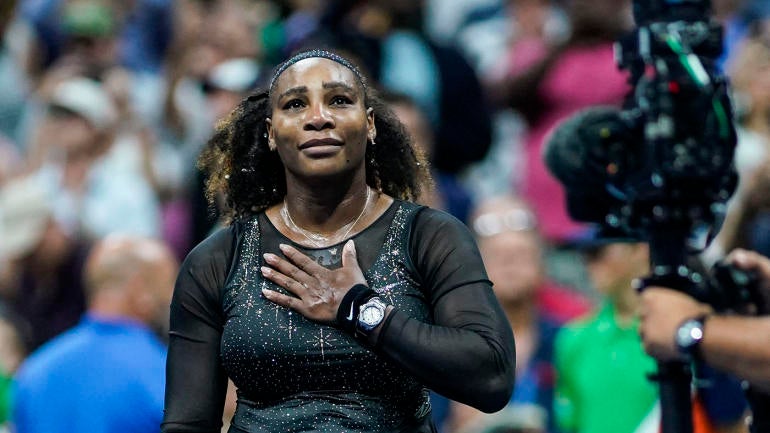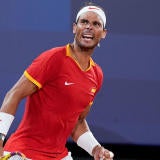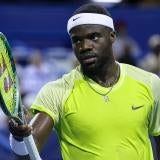
Rare is the athlete -- legendary or ordinary -- who leaves the arena entirely on their own terms. Serena Williams did not want her career to end on Friday night at Flushing Meadows in New York. But, barring a change of heart in the months to come, end it did.
Williams' denouement at 40 years old came at the unrelenting hands of a player almost 12 years her junior, Ajla Tomljanovic. One of the greatest tennis players ever was felled 7-5, 6-7, 6-1 in the third round of the US Open. It was Williams' earliest exit in this major since she was 16 years old -- all the way back in 1998. That was her first draw in this event.
One year later, she'd begin her ascent to global tennis dominance and win the US Open, the first of her 23 majors -- a record in tennis' Open Era.
Williams leaves the game second all-time in majors to Margaret Court's 24. In the eyes of most who know and love the sport, Williams holds claim to the GOAT status that's been heaped upon her in the winter of her transcendent 23-year run. Given how she won 73 titles, 367 major matches, four Olympic gold medals and redefined what was possible on a tennis court, there's little argument against Williams being regarded as the game's most dominant, physical, athletic, graceful and inspiring player ever.
Outside of the trophies and records, the greatest thing you can say about Serena Williams is that she played tennis unlike anyone before her, and at the same time her style can't be duplicated. Like all legends, she has a singularity to her greatness.
And yet, she entered this US Open with uncertainty. Expectations were lower for her than anything she'd been playing with since she was 16 years old. She said so herself earlier this week. This was a farewell tour with no guarantee of more than one match.
But this is Serena.
It was not going to end with one match.
She became the center of the sports universe one more time this week, owning her legend and building upon it, even without a deep run into the 21st and seemingly final US Open of her life. On Friday night in Flushing Meadows, Williams put on the kind of show that will linger as a final image of a virtuoso career. Even if the result wasn't on her side, even if she didn't fully dictate the way she went out, she made sure to carve a memorable conclusion into a final, epic chapter.
There is a lot to be discovered and gained in losing. With millions around the world watching and a riveted crowd at Arthur Ashe Stadium hanging on her every swing, Williams' play was as inspiring as it's ever been. On the heels of two surprising (but really not all that surprising) wins in the first two rounds, we all started to wonder, if not try to envision it... could something epic be in the making?
Not quite. But something memorable transpired anyway. The way Williams put on her career-closing performance was gripping enough to add to her legend. No, she didn't go out on her own terms. She did go out with everything she had, though. It took Tomljanovic 3 hours and 5 minutes to swipe Williams out of this 142nd US Open. It was the longest US Open match of Williams' life. Fitting.
The final game of her career featured eight deuces, six match points and took 14 minutes to complete. Down 5-1, Williams still managed to blow Tomljanovic back on her heels a couple of times, then dupe her into a net winner and dazzle the crowd once more.
The 29-year-old could not be cracked, though. The drama of tennis is how a match's end can hinge on one swing of the racket. A point goes one way, the match is over. It goes another, there is no telling how much longer the battle ensues. Williams and Tomljanovic made those last 14 minutes feel like an hour.
And then, all too suddenly, it ended. The depressing sound of Williams' forehand shot getting caught in the net was like a punch to the gut. Over. Just like that. Fifty-three minutes into the final set of her career, Williams' run was done. A unique American sports star put on a marathon performance, one that ends with some what-could-have-been in its aftermath.
Williams (officially ranked 605th in the world heading into the US Open) led Tomljanovic (ranked 46th) 5-3 in the first set. At that point it looked like Williams could make short work on a Friday night and set up a Sunday fourth-round match that would really build toward one of the biggest sports stories of 2022. Instead, Tomljanovic was able to match big serves with bigger returns. Over the course of three hours, she tickled the baseline and sideline for at least a dozen points, often to the chagrin of Williams, who's grown accustomed in her two-plus decades of dominance to see opponents send those shots long.
Friday night was first time these two played each other. Their one and only meeting should go down as one of the most memorable matches of Williams' career. Williams was not going to go out obediently. In an unaccustomed moment of raw honesty from a pro athlete, Tomljanovic said afterward she didn't even expect to win.
"What she's done for me, for the sport of tennis is just incredible," Tomljanovic said. "I never thought I'd have a chance to play her in her last match when I was a kid watching her in all those finals. This is a surreal moment for me."
For all of the praise Tomljanovic had for Williams after the match, she was unflappable most of the night. Her ground strokes matched the authority of Williams'. She grew steadier, more confident as the New York night wore on. Williams, a day removed from playing the final doubles match of her career alongside big sister Venus, was overcoming some visible fatigue with her signature passion, vocal reinforcement and granite-like will.
This was only Williams' seventh match in a year's time.
This was inspiring as hell.
Tomljanovic flipped the first-set script, from down 5-3 to winning 7-5. Williams came out and immediately won the first game of the second set. Then, everything started clicking. She was reading Tomljanovic's angles. The serve was powerful, reliable. The vintage, powerful two-handed backhand was landing for Williams. She was up 4-0. She was cruising to a third set.
Until Tomljanovic spoiled it again. Down 5-2, there was a marathon game with nine deuces and 24 points that lasted just over 15 minutes. Tomljanovic won, cutting it to 5-3. Then it was 5-5. They'd go to tiebreak, and Williams refused to be swept. It was at this point that the match encroached on memorable status. On her way to winning the second set in that tiebreak, Williams hit a serve 117 miles per hour, her hardest of the night.
More than two hours into the match.
Everything you got, Serena.
From a competitive standpoint, it was everything tennis fans could have hoped for. Williams was getting pushed but she wasn't buckling. She wouldn't give this one away. This match was so good, so gripping, so drenched with drama, Williams could not be faulted for second-guessing her retirement decision in the months to come.
Don't bank on it, though. This was not the desired outcome, but it was about as satisfying as any loss could be. Now comes the next stage. In addition to being a fashion mogul, Williams is first and foremost a doting and devoted mother. In her post-match press conference, she surmised she's spent all except maybe two or three days of her daughter Alexis' life with her. Bigger family plans await.
Endings in sports can carry a bittersweet element to them, but in hearing Williams give an impromptu goodbye speech, she showed why now is the time and who made her into the champion she'll always be remembered as.
"Thank you, Daddy, I know you're watching," Williams said on mic to her father when she was interviewed on-court after the match.
Her voice began to crack. A few tears showed.
"It all started with my parents and they deserve everything, so I'm really grateful for them," she said. "Oh my God. These are happy tears, I guess, I don't know. And I wouldn't be Serena if there wasn't Venus. So, thank you, Venus. … She's the only reason Serena Williams ever existed."
The stoic-looking big sister finally broke, too. Cameras soon caught her wiping away tears under the brim of her visor.
A great American tennis story found its conclusion Friday night in Queens. Few things in sports carry the emotional power and irresistible pull of an aging athlete plunging into the depths of their competitive soul and recapturing what made them great to begin with. For three final matches this week, for the first time in years, we got one final chance to see what made Serena Williams great.
Forty years old and fighting her guts out until the final push of the racket.
Couldn't have it any other way.
















